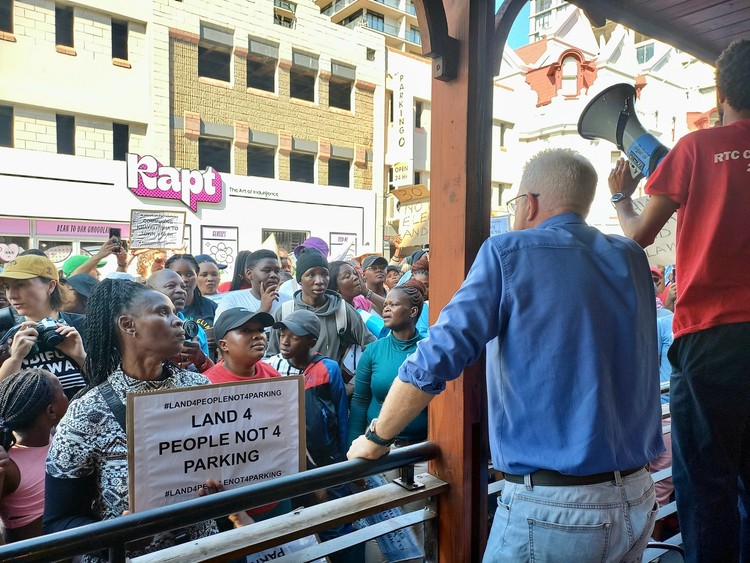Housing activists confront Western Cape Premier at coffee shop
Campaigners want government car parks developed for affordable inner city housing
Housing Activists surprised Western Cape Premier Alan Winde at a cafe on Saturday morning. Winde promised to meet with Ndifuna Ukwazi and Reclaim the City to discuss housing developments in the inner city. Photo: Marecia Damons
- On Saturday, dozens of people marched in central Cape Town as part of the #Land4PeopleNot4Parking campaign.
- Housing activist groups Ndifuna Ukwazi, Reclaim the City, The Housing Assembly, and Indibano Yabahlali are calling for state-owned parking lots to be made available for affordable housing.
- The groups have identified four sites in Cape Town’s inner city which they say could be used to build at least 2,000 homes.
- Western Cape Premier Alan Winde has promised to meet the groups.
About 80 housing activists surprised Western Cape Premier Alan Winde at a cafe in Buitenkant Street, Cape Town, on Saturday morning, while he was having coffee with provincial education MEC David Maynier.
The group of housing activists from Ndifuna Ukwazi (NU), Reclaim the City, Housing Assembly, and Indibano Yabahlali were marching in central Cape Town as part of the #Land4PeopleNot4Parking campaign. They are calling for state-owned parking lots to be used to provide affordable housing.
Winde told the crowd he had written to Ndifuna Ukwazi and Reclaim the City to talk about nine properties for development in the inner city.
“I’m happy to add the parking lots to that discussion,” he said.
Winde also said he wished to discuss the occupations of the former Woodstock Hospital (renamed Cissie Gool House by occupiers) and the former Helen Bowden Nurses Home (renamed Ahmed Kathrada House) in Green Point. Reclaim the City has occupied the buildings since 2017.
People from the crowd shouted, “It must happen before we vote! Before elections!”
Winde was handed an affordable housing proposal by an NU representative.
#Land4PeopleNot4Parking
The #Land4PeopleNot4Parking campaign had identified four sites: Parliament’s parking lot on Roeland Street, owned by the national government; Top Yard parking lot on Glynn Street and government garages on Hope Street and Roeland Street, all owned by the Western Cape government.
In a joint statement, activists said these four state-owned parking lots could create a racially and economically diverse neighbourhood by providing 969 social housing apartments, 969 market-related apartments, homes for 732 people in transitional housing, parking for Parliament in multi-storey parking, and a new communal and public space.
On Saturday, the groups marched to each of the four sites.
“Parking lots are prioritised over people,” said Megan Indiphile Bobotyana, one of several hundred people occupying the Helen Bowden Nurses Home, where she has lived for seven years.
“We want a more just society where we can also live in the CBD, walk to work and parks, and have safe spaces.”
“We have actual plans. We can give them [government] prototypes if that’s what they want. We’ve done our research … All we need is for the public land to come back to the public,” said Bobotyana.
Tsukie Bhalindlela, one of about 900 people living in Cissie Gool House, said: “The government is giving land on the outskirts. When you are evicted, they will send you to places like Blikkiesdorp and Wolwerivier. But we can’t afford that because we can’t afford to take three taxis to town while we work for little money.”
NU researcher Robyn Park-Ross said they had worked with architects, designers, and social housing experts. “We can keep the same amount of parking for Parliament so they have nothing to complain about and 2,000 families could be living here surrounded by schools, clinics and everything the city centre has to offer.”
Next: 14 years after court order, government starts building special school in Makhanda
Previous: Kaizer Chiefs vs Sunday World: Press Ombud rules against headline
© 2024 GroundUp. This article is licensed under a Creative Commons Attribution-NoDerivatives 4.0 International License.
You may republish this article, so long as you credit the authors and GroundUp, and do not change the text. Please include a link back to the original article.
We put an invisible pixel in the article so that we can count traffic to republishers. All analytics tools are solely on our servers. We do not give our logs to any third party. Logs are deleted after two weeks. We do not use any IP address identifying information except to count regional traffic. We are solely interested in counting hits, not tracking users. If you republish, please do not delete the invisible pixel.



